#1: Je T’aime Moi Non Plus by Jane Birkin and Serge Gainsbourg
City: Ottawa, ON
Radio Station: CFRA
Peak Month: November-December 1969
Peak Position in Ottawa ~ #1
Peak position in Vancouver ~ did not chart
Peak Position on Billboard Hot 100 ~ #58
Peak position on Austrian Singles chart ~ #1
Peak position on Norwegian Singles chart ~ #1
Peak position on Swiss Singles chart ~ #1
Peak position on UK Singles chart ~ #1
Peak position on Dutch Singles chart ~ #2
Peak position on Irish Singles chart ~ #2
Peak position on West German Singles chart ~ #3
Peak position on Mexican Singles chart ~ #5
YouTube: “Je T’aime Moi Non Plus”
Lyrics: “Je T’aime Moi Non Plus”
Serge Gainsbourg was born Lucien Ginsburg in Paris, France, in 1928. His parents were Russian Jewish immigrants. Lucien enrolled in the Ecole Normal in Paris at age 12. His childhood was profoundly affected by the occupation of France by Germany during World War II. The identifying yellow star that Jews were required to wear haunted Gainsbourg. In later years he was able to transmute this memory into creative inspiration with his 1975 song “Yellow Star”. During WWII he escaped with his family to Limoges, in France’s free zone. The family took refuge in the town of Grand Vedeix in the commune of Saint Cyr in the Haute-Vienne department, using the name Guimbard. He was hidden by nuns at Sacré-Cœur. He remained a boarder there for six months under his false identity. One evening, the Gestapo raided the establishment to check that no Jewish children were hiding there. Warned, the boarding school officials sent him to hide alone in the forest, equipped with an axe to defend himself, where Lucien spent the entire night in fear of being caught and killed.
After WWII, he attended Beaux-Arts de Paris. Lucien was conscripted into the French Army in 1948 for a year. He never saw action, and spent his time playing dirty songs on guitar, visiting prostitutes, and drinking. He later claimed that the military service turned him into an alcoholic. Lucien obtained work teaching music and painting at a school founded by rabbis just outside of Paris. He moved on to work in piano bars, and became a venue pianist at France’s first drag cabaret club Madame Arthur. While completing a form to join The Society of Authors, Composers, and Publishers of Music (SACEM) he changed his name from Lucien to Serge, viewing the latter as a more masculine and aristocratic name. As well, he changed his surname from Ginsburg to Gainsbourg in an homage to the English painter Thomas Gainsborough.
In 1957, while playing piano at the Milord l’Arsouille club, it was learned that Gainsbourg wrote his own songs. He was persuaded to perform some of them on stage. Despite his stage fright, Gainsbourg performed his own repertoire, including “Le Poinçonneur des Lilas,” which describes a day in the life of a Paris Métro ticket man, whose job is to validate passenger tickets by stamping holes in them. In the song, the job is described as so monotonous, that the ticket man eventually thinks of putting a hole through his head and being buried in another hole. After the debut, Serge was given a steady performance segment at the club. In 1958, Serge Gainsbourg released his debut jazz album Du chant à la une !… In 1959 the album was given an Académie Charles Cros award. In 1960, his fifth single release – “L’Eau à la bouche” – charted on the Belgian record survey.
In 1960 Gainsbourg played a role as a Roman officer in The Revolt of the Slaves. The following year he co-starred with Brad Harris and Italian bodybuilder Alan Steel (born Sergio Ciani) in Sansone.
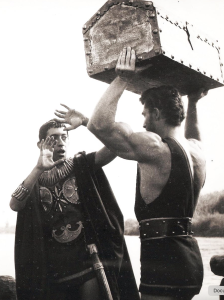
Serge Gainsbourg (L) played the treacherous
court counselor Warkalla who takes possession
of the throne of Sulan. Sansone (Sampson) and Hercules
team up to regain the kingdom from Warkalla.
In 1962, Gainsbourg returned to the screen along with Brad Harris and Alan Steel in The Fury of Hercules. In this b-movie, Serge Gainsbourg plays the tyrant Meniste who has enslaved the citizens of the homeland of Hercules.
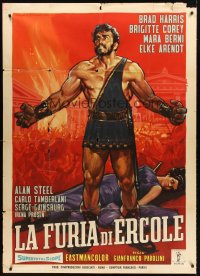
Serge Gainsbourg’s name appears
in 1962 movie poster (bottom left)
In 1964, Gainsbourg scored the music for the French comedy film How Do You Like My Sister? (French: Comment trouvez-vous ma soeur?). In 1967, he scored music for the film Anna, starring Anna Karina, Marianne Faithfull (in which he also starred).
In 1968, Gainsbourg recorded a French-language duet with Brigitte Bardot titled “Bonnie and Clyde”. It charted into the Top 20 of the Belgian record survey. That year his first charting single in France cracked the Top. It was titled “Requiem Pour un Con”. He also released the single “Initials B.B.” The song is a poetic evocation of Gainsbourg’s relationship with Bardot in 1967. Bardot was so famous at the time that her initials were enough to know whom people referred to. The tune cracked the Top 50 in Belgium and charted in France. In 1968, Gainsbourg also scored music for the French-language crime film Le Pacha.
Jane Birkin was born in 1946 in London. In 1965, at the age of 18, she married British conductor John Barry. (The marriage ended in divorce in 1968). At the age of 18, she had her debut appearance on the screen as a girl on a motorbike in the British comedy The Knack …and How to Get It. At the age of 19, she appeared in the role of a ‘blonde girl’ in the 1966 Michelangelo Antonioni psychological mystery film Blowup starring Vanessa Redgrave and The Yardbirds. That year she also appeared as ‘an exquisite thing’ in the crime comedy Kaleidoscope starring Warren Beatty and Susannah York.
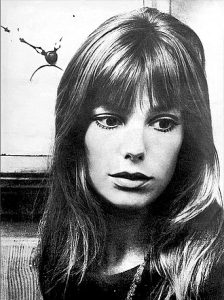
Jane Birkin (1968)
In 1968, she met Serge Gainsbourg as they co-starred in Slogan. This was a satirical romantic comedy-drama about a 40-year-old who has an affair with a young British woman when they meet at a festival in Venice.
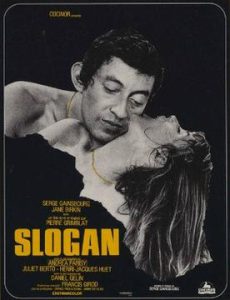
Later in 1968, Birkin appeared in the psychedelic film Wonderwall based on the music of George Harrison.
In 1969 Serge Gainsbourg and Jane Birkin recorded “Je T’aime Moi Non Plus”.
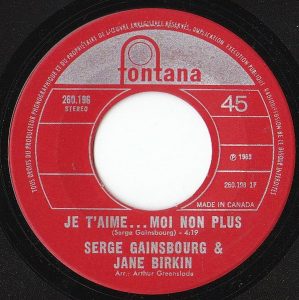
“Je T’aime Moi Non Plus” was written and recorded in late 1967 for Gainsbourg’s then-girlfriend, Brigitte Bardot. After a disappointing date with Bardot, she “phoned and demanded as a penance” the following day that he write, for her, “the most beautiful love song he could imagine”; that night, he wrote “Je t’aime” and “Bonnie and Clyde”. They recorded an arrangement of “Je t’aime” by Michel Colombier at a Paris studio in a two-hour session in a small glass booth. The engineer William Flageollet said there was “heavy petting”. However, news of the recording reached the press, and Bardot’s husband, German businessman Gunter Sachs, angrily called for the single to be withdrawn. Bardot pleaded with Gainsbourg not to release it. He complied, but was not pleased: “The music is very pure. For the first time in my life, I write a love song and it’s taken badly.”
In 1968, Gainsbourg and the English actress Jane Birkin began a relationship on the set of the film Slogan. After the end of filming, he asked her to record “Je t’aime” with him. Birkin had heard the Bardot version and considered it “so hot”. Birkin has stated that “I only sang it because I didn’t want anybody else to sing it”, jealous at the thought of Gainsbourg sharing intimacy in the recording studio with someone else. Gainsbourg asked her to sing an octave higher than Bardot, “so [she’d] sound like a little boy.” Birkin said that she “got a bit carried away with the heavy breathing – so much so, in fact, that I was told to calm down, which meant that at one point I stopped breathing altogether. If you listen to the record now, you can still hear that little gap.”
The single, which Philips Records relegated to its subsidiary Fontana label, had a plain cover, with the words “forbidden to those under 21” (“Interdit aux moins de 21 ans“). Gainsbourg described “Je t’aime” as an “anti-fuck” song about the desperation and impossibility of physical love. The lyrics are written as a dialogue between two lovers during sex. Phrases include:
“Je vais et je viens, entre tes reins” (“I go and I come, between your loins”)
“Tu es la vague, moi l’île nue” (“You are the wave, me the naked island”)
“L’amour physique est sans issue” (“Physical love is hopeless” [Gainsbourg sings ‘sensationnel‘ in another version])
The first time Gainsbourg played the song in public was in a Paris restaurant immediately after he and Birkin recorded their version. Birkin said that “as it began to play all you could hear were the knives and forks being put down. ‘I think we have a hit record’, Gainsbourg said.”
The sounds made by Birkin caused the song to be banned from radio in Spain, Sweden, Brazil, the United Kingdom, and Italy, banned from radio play before 11PM in France, and not played by many radio stations in the United States. The song was officially denounced by the Vatican and its newspaper, L’Osservatore Romano one report even claimed that the Vatican had excommunicated the record executive who released it in Italy. Birkin said that Gainsbourg had called the Pope “our greatest PR man”. In Italy, the head of their record label was jailed for offending public morality.
“Je T’aime Moi Non Plus” reached #1 in Ottawa for seven weeks. It also topped the pop charts in Hartford (CT), and Fairfax (VA), climbed to #2 in Oshkosh (WI), and Boston, #3 in Washington DC, #5 in Gaithersburg (MD), and #9 in Seattle, and Milwaukee (WI). Internationally, “Je T’aime Moi Non Plus” peaked at number-one in Austria, Norway, Switzerland, and the UK, #2 in Ireland and the Netherlands, #3 in West Germany, #5 in Mexico, and #58 on the Billboard Hot 100 in the USA.
The album Jane Birkin/Serge Gainsbourg reached #4 on the pop album chart in France. (Brigitte Bardot later regretted not releasing her version, and her friend Jean-Louis Remilleux persuaded her to contact Gainsbourg. They released the recording by Bardot and Gainsbourg in 1986).
The 1969 single was re-released in 1974 and it climbed to #4 in the Netherlands.
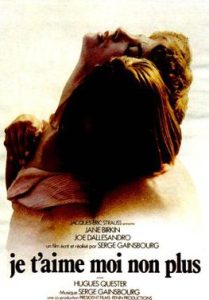
In 1976, Gainsbourg scored the 89-minute erotic drama film Je t’aime moi non plus (English title: I Love You, Me Neither). It starred Jane Birkin and included Gérard Depardieu in a supporting role. This was the first of five films Gainsbourg directed.
Later in 1969, Birkin and Gainsbourg starred in a French-Italian crime-drama Les Chemins de Katmandou. The film was based on a novel about a man who joins a group of hippies who live and travel in Nepal. Once they get to Katmandu they take drugs, and practice free love in the belief that it will free them from materialism, only to meet disappointment.
In 1970, Serge Gainsbourg scored music for the art film short Cannabis.
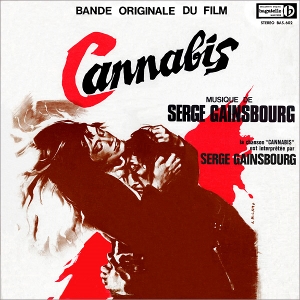
In 1972, Gainsbourg and Birkin recorded another single titled “La Décadanse”. The single reached #13 in Belgium and cracked the Top 50 in France.
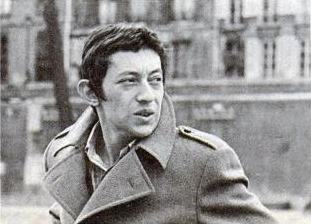
Serge Gainsbourg (1971)
In 1971, Jane Birkin co-starred with Yul Bryner and Eli Wallach in the French-Italian-Yugoslav adventure film Romance of a Horsethief. The film was distributed in English, French, Italian and Serbo-Croatian.

In 1975, Gainsbourg had a minor role in the Jane Birkin R-rated adult film Sérieux comme le plaisir about road trip and polyamorous relationship between two men and one woman. That year Birkin released her third studio album, Lolita Go Home, with half the tracks written by Serge Gainsbourg.
In 1975, Gainsbourg’s album Rock Around the Bunker peaked at #5 on the French pop album chart. In 1979, his thirteenth studio album, Aux Armes et cætera, topped the pop album chart in France. In 1980, Serge Gainsbourg released a duet with French actress Catherine Deneuve titled “Dieu fumeur de Havanes”. The song peaked at #8 on the pop chart in France.
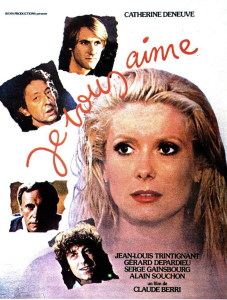
That year Gainsbourg starred in I Love You All, starring Catherine Deneuve and Gérard Depardieu.
In 1983, Jane Birkin released her fifth studio album Baby Alone in Babylone. This was her first collaboration with Gainsbourg since their romantic relationship dissolved in 1980 as a consequence of his alcoholism and violence. She dated and married French film director Jacques Doillon (who she would later separate from in 1993).
Birkin was described as having carried a hand-woven straw basket from Castro Marim in Algarve, Portugal, everywhere she went, from the market, to nightclubs, to formal events until her husband Jacques Doillon intentionally ran over it with his car in the early 1980s. In 1983, Hermès executive Jean-Louis Dumas was seated next to Birkin on a flight from Paris to London. Birkin had placed her straw basket in the overhead compartment of her seat and the contents fell out onto the floor, leaving her scrambling to recover them. Birkin told Dumas that it had been difficult to find a leather weekend bag she liked. She sketched a design for her ideal bag for Dumas and said it should have pockets. In 1984 Dumas created a black supple leather bag for her, which he called the Birkin Bag.
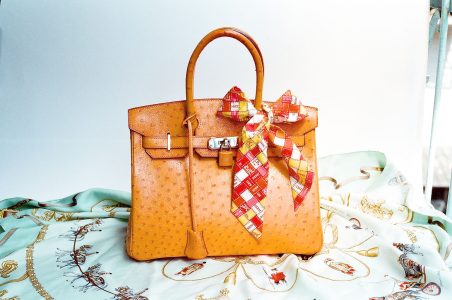
By 2007, Time magazine was reporting that the custom-made Birkin Bag ranged from $7,000 to $100,000. It was sported by Jane Birkin, Gwyneth Paltrow, Janet Jackson, Victoria Beckham, Lindsay Lohan, Martha Stewart and many others. By 2015, the handbag was retailing for between $10,000 to $150,000.
In 1984, Gainsbourg’s album Love on the Beat climbed to #3 on the pop album chart in France, and You’re Under Arrest reached #2 on the pop charts in France in 1987. That year Serge Gainsbourg’s single “Lemon Incest” from the 1984 album Love on the Beat reached #2 on the pop chart in France.
Jane Birkin won the “Best Actress” award at the 1985 Orleans Film Festival for Leave All Fair. The jury of the 1985 Venice Film Festival recognised Birkin’s performance in Dust as amongst the best of the year. They decided not to award a best actress prize because all of the actresses they judged to have made the best performances were in films that won major awards. Dust won the Silver Lion prize.
Birkin earned three nominations at the Cesar Awards, including for “La Pirate,” (1984) directed by Jacques Doillon. She received a Cesar Award Best Supporting Actress nomination in 1994 for her performance in La Belle Noiseuse.
In 1988, a French essay film, Jane B. par Agnès V., starred Jane Birkin with Serge Gainsbourg in a supporting actor role.
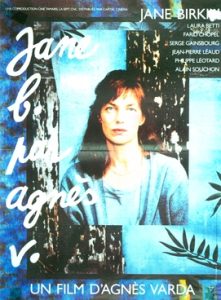
In the film, Birkin confesses her challenges to perceive herself as beautiful once she turned 40 (in 1986).
Gainsbourg wrote over 550 songs, which have been covered more than 1,000 times by diverse artists. His lyrical works incorporated wordplay, with humorous, bizarre, provocative, sexual, satirical or subversive overtones. Throughout his adult life he smoked five packs of cigarettes a day. When he died in March 1991 Serge Gainsbourg was 62 years of age.
A 1991 re-mix of “Requiem Pour un Con” climbed to #8 on the pop chart in France after Gainsbourg died. In 1994, Jane Birkin auctioned her original Birkin Bag bag to support Sidaction, a French charity that fights HIV/Aids.
Since his death from a second heart attack in 1991, Gainsbourg’s music has reached legendary stature in France.
While controversial in his lifetime, he has become one of France’s best-loved public figures. He has also gained a cult following across the world with chart success in the United Kingdom and Belgium with “Je T’aime Moi Non Plus” and “Bonnie and Clyde”. The Parisian house in which Gainsbourg lived from 1969 to 1991, at 5 bis Rue de Verneuil, remains a celebrated shrine, with his ashtrays and collections of various items, such as police badges and bullets, intact.
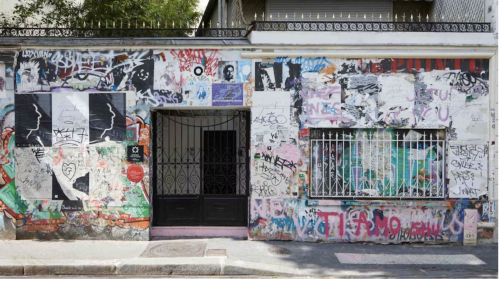
5 Rue de Verneuil, Paris
Maison Gainsbourg Boutique, at 14 Rue de Verneuil, has exhibits of Serge Gainsbourg’s life, tours of the house at 5 Rue de Verneuil, a museum, screenings, a restaurant, bar and shop.
The outside of the house is covered in graffiti dedicated to Gainsbourg, as well as with photographs of significant figures in his life, including Bardot and Birkin.
In 2001 Jane Birkin became an Officer of the Order of the British Empire “for services to acting and UK-French cultural relations.” The following year she received an Order from the Prince of Wales. She made her directorial debut with Boxes which played at the Cannes Film Festival in 2007.
Birkin was portrayed by her daughter Charlotte in the documentary feature Jane by Charlotte in 2021, which she also appeared in. It was her seventieth and final film. The critically acclaimed intimate documentary played at Cannes and was nominated for a Cesar Award. That same year Jane Birkin suffered a stroke. She died at the age of 76 in her Paris home in 2023. Two years after her death, the original Birkin Bag owned by Jane Birkin sold at a Sotheby auction for €8.6m Euros.
Update: December 28, 2025
Actress Brigitte Bardot died at the age of 91 on December 28, 2025.
December 1, 2025
Ray McGinnis
References:
Benjamin Ivry, “The Man With the Yellow Star: The Jewish Life of Serge Gainsbourg,” Forward, November 26, 2008.
Celia Walden, “Jane Birkin interview: Britain’s best-known ‘French actress’ on sex scenes with Bardot, life with Gainsbourg and recording the infamous duet Je T’aime…Mon Non Plus.” Telegraph, October 13, 2009.
Jason Solomons, “‘Serge needed all the love he could get’, Guardian, August 15, 2004.
Betsy Kroll, “In The Bag,” Time, April 17, 2007.
Elsa Keslassy, “Jane Birkin, British-French Actor and Singer, Dies at 76,” Variety, July 16, 2023.
“Original Birkin bag sells at auction for record €8.6m,” London Times, July 11, 2025.
“Maison Gainsbourg” website.
Nick Kent, “What a drag: Serge Gainsbourg is remembered as a celebrated lover, wit and songwriter. But when Nick Kent spent a week with him, the crumbling deity was a death-fixated raging alcoholic,” Guardian, April 15, 2006.
Rachel Holman, “Twenty years on, Gainsbourg remains France’s favourite ‘enfant terrible’,” France24, March 3, 2011.
David B. Green, “Controversial French Singer Serge Gainsbourg Dies: 1991,” Haaretz, March 2, 2014.
Lee Smith, “Brigitte Bardot, French film star who gave up movies for animal rights, dies at 91,” CNN, December 28, 2025.
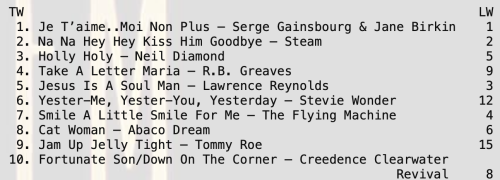
CFRA 580-AM Ottawa Top Ten | December 6, 1969

Leave a Reply